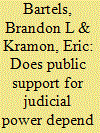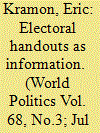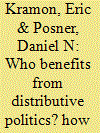|
|
|
Sort Order |
|
|
|
Items / Page
|
|
|
|
|
|
|
| Srl | Item |
| 1 |
ID:
171340


|
|
|
|
|
| Summary/Abstract |
Judicial power is central to democratic consolidation and the rule of law. Public support is critical for establishing and protecting it. Conventional wisdom holds that this support is rooted in apolitical factors and not dependent on who is in political power. By contrast, we argue that support may be driven by instrumental partisan motivations and therefore linked to partisan alignment with the executive. We test the argument with survey evidence from 34 African countries. To provide causal evidence, we conduct difference-in-differences analyses leveraging Ghana’s three presidential transitions since 2000. Across Africa, support for judicial power is high, while trust in courts is lower. However, presidential co-partisans are less supportive of horizontal judicial power over the president and more supportive of vertical power over the people. The article demonstrates the importance of partisan alignment with the executive in shaping support for judicial power, with implications for judicial behavior and legitimacy.
|
|
|
|
|
|
|
|
|
|
|
|
|
|
|
|
| 2 |
ID:
146056


|
|
|
|
|
| Summary/Abstract |
Why is vote buying effective even where ballot secrecy is protected? Most answers emerge from models of machine politics, in which a machine holds recipients of handouts accountable for their subsequent political behavior. Yet vote buying is common in many contexts where political party machines are not present, or where parties exert little effort in monitoring voters. This article addresses this puzzle. The author argues that politicians often distribute electoral handouts to convey information to voters. This vote buying conveys information with respect to the future provision of resources to the poor. The author tests the argument with original qualitative and experimental data collected in Kenya. A voter's information about a candidate's vote buying leads to substantial increases in electoral support, an effect driven by expectations about the provision of clientelist benefits beyond the electoral period. The results, showing that the distribution of material benefits can be electorally effective for persuasive reasons, thereby explain how vote buying can be effective in the absence of machine politics.
|
|
|
|
|
|
|
|
|
|
|
|
|
|
|
|
| 3 |
ID:
176089


|
|
|
|
|
| Summary/Abstract |
Political parties use different methods—such as holding rallies, door-to-door canvassing, and distributing gifts—to mobilize voters during election campaigns across Africa. But how do parties choose which approach to use in each constituency? We propose that parties prefer to hold rallies in core constituencies, and to use targeted strategies—canvassing and handouts—in swing and opposition districts. However, opposition parties may not have sufficient resources to pursue such a strategy. Ruling parties have the dual advantage of being in a strong financial position, and having the ability to target core voters with state benefits between elections. Using post-election survey data from Ghana’s 2012 election, we show that the ruling party canvassed the most in districts where they were electorally weak and concentrated rallies in their home constituencies. In contrast, the opposition party focused all of its efforts in its home districts. The results highlight how incumbency status shapes parties’ campaign behaviour. They also suggest that ruling parties can combine core and swing voter targeting in different stages of the electoral cycle.
|
|
|
|
|
|
|
|
|
|
|
|
|
|
|
|
| 4 |
ID:
121600


|
|
|
|
|
| Publication |
2013.
|
| Summary/Abstract |
Papers in the burgeoning empirical literature on distributive politics often focus their analysis on the pattern of distribution of a single patronage good-for example, cash transfers, roads, education spending, electrification, or targeted grants. Yet because governments can favor constituencies through the targeting of multiple public and private goods, drawing general conclusions about distributive politics by investigating just one (or even a few) good(s) can be misleading. We demonstrate the severity of this problem by investigating a particular manifestation of distributive politics-ethnic favoritism-in a particular setting-Africa-and show that the conclusions one draws about who benefits from government allocation decisions can vary markedly depending on the outcome one happens to study. Our findings suggest the need for caution in making general claims about who benefits from distributive politics and raise questions about extant theoretical conclusions that are based on empirical work that focuses on a single distributive outcome. The findings also provide a foundation for a new research agenda aimed at identifying the reasons why political leaders choose to favor their supporters with some public and private goods rather than others.
|
|
|
|
|
|
|
|
|
|
|
|
|
|
|
|
|
|
|
|
|